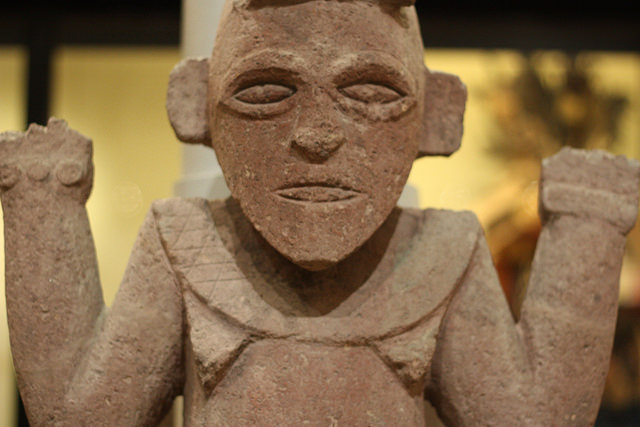A Litany Primer
By Mary Abrahamson
Embracing the richness of this beautiful prayer
Sometimes we hear or read churchly words and feel like they are far above us. We don’t understand their history, or why such high-falootin’ kinds of words have to be used.
In short, they don’t have to be used.
But they have been used for generations of church and home worship. And these words are part of the rich history of Christianity. These complicated sounding words define a shared tradition that unites us with all of the Holy Christian Church throughout time.
In this article I’m going to share what I’ve learned about the Litany so that you can come to love it as I do.
A litany is simply a prayer, a list of requests. In our tradition, a litany includes a series of prayers followed by simple responses. If you are praying alone, you can read both parts of the prayer to yourself or out load. I find the rhythms and cadences themselves to be soothing to my temperament, so I like to pray The Litany aloud even when I’m praying by myself.
When a litany is used in corporate worship, the prayers are read by the pastor and responses are then read or recited by all. In family devotion, a parent or family member can read the first part, and the others can respond. Or the parts can be read or recited back and forth by two evenly numbered groups of readers, as in an antiphon or choral number.
This is the Litany as it appears in the Evangelical Lutheran Hymnary. Likely if you have a different Lutheran Hymnal, you will have this litany, and if not, it will be very similar. This litany is based upon the Litany for the Saints from the pre-Reformation era Christian Church. Martin Luther removed from the Litany of his day the supplications to the saints and the prayers for the dead. As was his goal with so much of what he did, Luther left as much as he could of the old, removing only those things that reflected the unBiblical principles that had slipped into the church of His day.
Kyrie eleison.
Lord, have mercy upon us.Christe eleison.
Christ, have mercy upon us.Kyrie eleison.
Lord, have mercy upon us.O Christ, hear us.
O Christ, hear us.O God the Father in heaven,
Have mercy upon us.O God the Son, Redeemer of the world,
Have mercy upon us.O God the Holy Ghost, true Comforter,
Have mercy upon us.
Kyrie eleison, Christe eleison. This Greek phrase means, “Lord have mercy. Christ have mercy.”
This most basic prayer of Christiandom has been offered in one form or another to the Almighty God since the fall into sin and first promise of a Savior. This prayer, in it’s various forms, is often called simply the Kyrie. We see it in many places in Scripture phrased one way or another. The prayer of the tax collector in Jesus’ parable, “God, be merciful to me a sinner!” is perhaps the most recognized. In most liturgical settings, the Kyrie implies a three-fold repetition, signifying the Trinity.
In this version of the Litany, we pray both the shorter and longer forms of the Kyrie, with a couplet in between for God to hear our prayer.
Be gracious unto us.
Spare us, good Lord.Be gracious unto us.
Help us, good Lord.
Here we have two short couplets of entreaty to God, acknowledging that He, through His grace, is our Lord, the one who can spare and help us.
The next sections of the Litany, according to Luther Reed in The Lutheran Liturgy, include deprecations, obsecrations, supplications, and intercessions. The first two of these words are less familiar to us speakers of modern American English.
First come the deprecations. In today’s English, to deprecate something means to disapprove of it, or or to speak out against something of which we disapprove. But I found this archaic definition in an online dictionary, “to pray for deliverance from.” This understanding makes the following two sections easy to recognize as deprecations.
From all sin;
From all error;
From all evil:
Good Lord, deliver us.
This hearkens back to the Sixth and Seventh Petitions of the Lord’s Prayer, where we pray with all Christendom, “And lead us not into temptation; but deliver us from evil.”
From the temptations and assaults of the devil;
From sudden and evil death;
From disease and famine;
From war and bloodshed;
From sedition and rebellion;
From storms and natural disaster;
From all calamity by fire and water;
And from everlasting death:
Good Lord, deliver us.
Here we list a great many of the trials and tribulations that come during earthly life. The list of temporal troubles are contained within the first and last deprecations for deliverance from things eternal. This reminds me of meaning to the First Article, “that He richly and daily provides me with food and clothing, home and family, property and goods, and all that I need to support this body and life; that He protects me from all danger, guards and keeps me from all evil.”
The next section of the Litany consists of obsecrations. If you look carefully look the word obsecration you can see sacra which is from the same word as sacred, or set apart. We pray on account of, or by way of the sacred things listed. They are so far above us, we call them the holy mysteries. Outside of, or without, such mysteries, we may not approach our God. It is only because of Jesus’ perfect life and sacrificial death, and the work of the Holy Ghost who works faith in the same within us, that we can call God our Father and address our prayers to Him.
By the mystery of Your holy Incarnation;
By Your holy Nativity;
By Your Baptism, Fasting and Temptation;
By Your Agony and Bloody Sweat;
By Your Cross and Passion;
By Your precious Death and Burial;
By Your glorious Resurrection and Ascension;
And by the coming of the Holy Ghost, the Comforter:
Help us, good Lord.
This section also ties together with the Second and Third Articles of the Apostle’s Creed. I love the richness of this prayer. It continually ties together in our prayer and mediation so much of our Christian doctrine. I’ll continue to point these things out in the coming sections.
In all time of our tribulation;
In all time of our prosperity;
In the hour of death;
And in the Day of Judgment:
Help us, good Lord.We poor sinners do beseech You;
To hear us, O Lord God.
Here we see the first of the supplications. A supplication is a prayer on our own behalf. According to Christ’s selflessness which we ought always seek to emulate, the supplications are short and few. We simply pray God to help us in all things and at all times. And then we repeat our request for Him to hear our prayer.
What follows is several sections of intercessory prayer, or those prayers offered on behalf of others. We see reflected in the various sections emphasis and acknowledgment of the three estates or realms of authority here on earth, that of the church, the secular authorities, and finally the immediate family and community.
And to lead and govern Your holy Christian church in the right way;
To preserve all pastors and servants of Your Church in the true knowledge and understanding of Your Word, and in holiness of life;
To put an end to all godless teaching and causes of offense;
To bring into the way of truth all who have erred and are deceived;
To beat down Satan under our feet;
To send faithful laborers into Your harvest;
To accompany Your Word with Your Spirit and grace;
To raise up those who fall, and to strengthen those who stand;
And to comfort and help the faint-hearted and the distressed:
We beseech You to hear us, good Lord.
This section is for the spiritual well-being of God’s church, His bride. This reflects the theme of the first three commandments, “You shall have no other gods; You shall not take the name of the Lord your God in vain; You shall keep the day of rest holy.” We also are reminded of the first three petitions of the Lord’s Prayer, “Hallowed be Thy name; Thy kingdom come; Thy will be done on earth as it is in heaven.”
To give to all nations peace and concord;
To preserve our country from discord and contention;
To direct and defend our government, and all in authority;
And to bless and keep all who administer justice, and all our people:
We beseech You to hear us, good Lord.
In whatever form it takes, and although peopled by sinners, government itself is instituted by God for our good. And so we lift up in prayer all secular institutions, but particularly our nation and its leaders.
To behold and sustain all who are in danger, necessity and tribulation;
To protect all who travel;
To preserve all women in the perils of childbirth;
To strengthen and keep all sick persons and young children;
To set free all who are innocently imprisoned;
To defend and provide for all fatherless children and widows;
And to have mercy on all people:
We beseech You to hear us, good Lord.
These petitions are for all of us in the regular times of life. We pray for parents and children, friends and relatives, and all people everywhere. We pray for our neighbor, as Jesus defines it in the account of the Good Samaritan.
To forgive our enemies, persecutors, and slanderers, and to turn their hearts;
To give and preserve to our use the fruits of the earth;
And graciously to hear our prayers:
We beseech You to hear us, good Lord.
Here we have two closing petitions which I find interestingly linked. We have a prayer for the forgiveness of our enemies. This follows Jesus’ example on the cross, “Father forgive them, for they do not know what they are doing.” We also see the same message near the end of Matthew 5, “But I say to you, love your enemies, bless those who curse you, do good to those who hate you, and pray for those who spitefully use you and persecute you.”
The final request in this section is again supplication, something we pray for ourselves. This line is a prayer for God’s blessings on our use of mammon, the earthly blessings with which He showers us. This is in accord with the First Article, where we see God’s preservation of His people. We also pray in like manner in meaning of the Fourth Petition, “What is meant by daily bread? Daily bread includes everything needed for this life, such as food, drink, clothing, shoes, house, home, fields, cattle, money, goods, God-fearing spouse and children, faithful servants and rulers, good government, good weather, peace, health, order, honor, true friends, good neighbors, and the like.”
O Lord Jesus Christ, Son of God;
We beseech You to hear us.
We repeat again a plea for God to hear our prayer. Each time I notice this repetition, I think of the Lord’s prayer. In the meaning to the Introduction we say, “God would hereby tenderly invite us to believe that He is our true Father, and that we are His true children, so that we may ask Him with all boldness and confidence, as children ask their dear father.”
O Lamb of God, You take away the sin of the world;
Have mercy upon us.O Lamb of God, You take away the sin of the world;
Have mercy upon us.O Lamb of God, You take away the sin of the world;
Grant us Your peace.
This is the Agnus Dei, or the Lamb of God. These beautiful words have been sung during the service of Holy Communion in Christian liturgies since as early as the 700s. In it we are reminded of John the Baptist’s cry, “Behold the Lamb of God who takes away the sin of the world.” It calls to mind all the allusion of the Savior being a Lamb in Isaiah and throughout the Old Testament prophets. We see it in the Ceremonial Laws that the Children of Israel repeated over and over until those Laws and their imagery were fulfilled in Jesus Christ. All those sacrifices and ceremonies showed our need for our atonement and gave forgiveness at God’s command because they were fulfilled in Jesus life and death. And again, this picture is repeated in one of my favorite passages, in Revelation 7, “ These are the ones who … washed their robes and made them white in the blood of the Lamb.” Through this Lamb, and His washing, come God’s mercy and eternal peace.
O Christ, hear us.
O Christ, hear us.
Again, this plea for God to hear our prayer. As we say in the meaning to the Closing of the Lord’s Prayer, “We can be sure that these petitions are acceptable to our Father in heaven and are heard by Him; for He Himself has commanded us so to pray and has promised to hear us.” Although the Litany is not the Lord’s Prayer, this prayer is Scripture. And as such it is in in line with God’s will. So we can say, “He Himself has commanded us so to pray and has promised to hear us.”
Kyrie eleison.
Lord, have mercy upon us.Christe eleison.
Christ, have mercy upon us.Kyrie eleison.
Lord, have mercy upon us.
Our Litany repeats one final three-fold Kyrie, and closes with the prayer Jesus gave us.
Our Father, who art in heaven, Hallowed be Thy name, Thy kingdom come, Thy will be done on earth as it is in heaven. Give us this day our daily bread; And forgive us our trespasses, as we forgive those who trespass against us; And lead us not into temptation, But deliver us from evil. For Thine is the kingdom and the power and the glory forever and ever. Amen.



